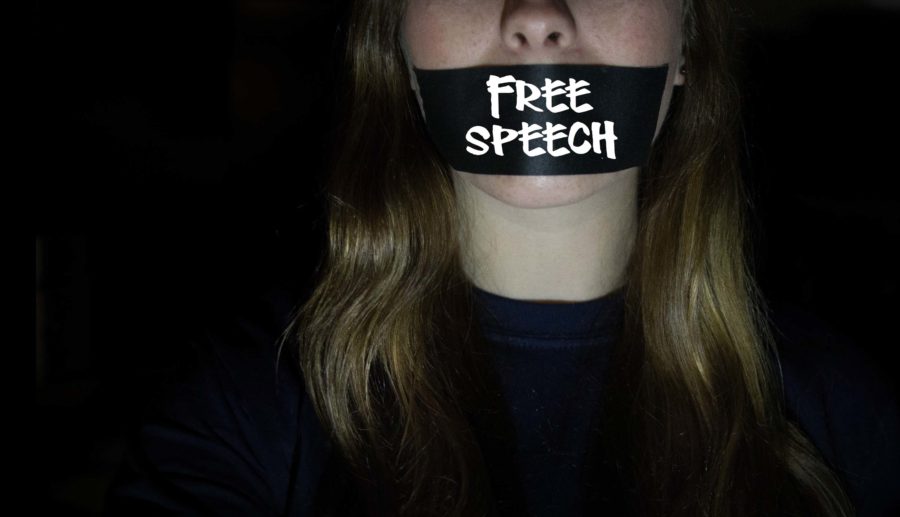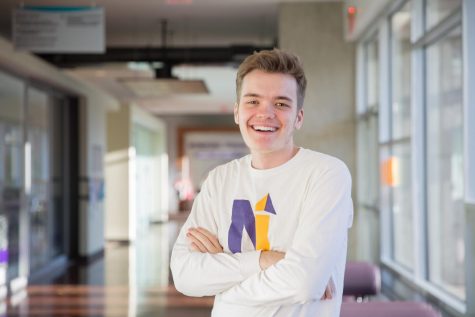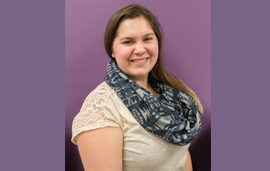Free Speech
Apr 21, 2016
Whether it’s a racial slur casually tossed around on campus or a racially charged comment in the classroom, limiting speech is up for debate at UNI. Does a potentially hurtful comment stimulate dialogue or suppress voices?
“When this is not a difficult issue for someone, I don’t quite trust them,” said Jim O’Loughlin, associate professor of English. He went on to say that the problem arises when the issue becomes simply “free speech at all costs,” or simply, “no one should ever be offended.”
“The fact is that it is complicated,” O’Loughlin said. “There is a tension, and it should be discussed.”
For many, the possibility of limiting speech and expression is complex; there are few clear solutions.
A context of tension
Hateful or hurtful speech, as well as microaggressions, have become a prominent topic of discussion as recently as last semester. Racist speech in particular has received attention at multiple forums that were held in the fall. During that time, students voiced concerns over encounters with what they called ignorant speech, and a perceived pattern of neglect on the part of administrators
One forum was for students only, and a following forum was attended by faculty, staff and administration. Over the course of three hours, some 80 students shared personal experiences on campus about when they felt uncomfortable or hurt by racially insensitive comments.
“We can’t change what [individual] students think,” sophomore elementary education major, Chloey Arispe, said at the time. “I mean, when I hand out a flyer for the baile and someone goes, ‘Oh, this is just a beaner thing,’ I can’t control what’s coming out of their mouth. But I want [to]; I want to control what happens when I report it — when I say, ‘Hey, I’m not feeling comfortable.’”
The forums came on the heels of a boycott by the university’s multicultural student recruitment arm, Ethnic Student Promoters (ESP), of a university recruitment day that advertised a multicultural emphasis.
At the time, ESP, in a letter to President Bill Ruud, said they did not support “the recruitment of students who could potentially be blindsided by this hostile environment.”
Hansen Breitling, senior philosophy major, arranged the ESP boycott and subsequent forums. He said there were many students of color who shared stories at the forums.
“Microaggression after microaggression, comment after comment, incident after incident. They all just piled up on one another,” Breitling said. “[There was] so much unaddressed hurt and so many voices that have been silenced by the lack of proper procedures and protocol [on the part of] the university.”
Breitling, director of diversity for the Northern Iowa Student Government (NISG), said he receives biased incident reports outlining situations in which students feel they experienced offensive behavior.
He said that he recently received a report of threats made against a male black student and a female white student, who are a couple. They received notes under their door denouncing interracial relations and the following statement: “You’re going to be the next Trayvon Martin.”
Speech in the classroom
For others at UNI, the complexity of limiting speech emerges when discussing what should or should not be said in classroom settings.
O’Loughlin said that the classroom can be used for exploring issues that might otherwise be uncomfortable in such a way as to sincerely ask difficult questions.
“I think when language seems to be used for a destructive reason, that’s it,” O’Loughlin said. “There’s not going to be meaningful learning from that.”
O’Loughlin pointed to a recent discussion his class had on the use of “the n-word” in Mark Twain’s “The Adventures of Huckleberry Finn.” A teacher shouldn’t avoid the book for this reason, O’Loughlin said, but should approach the topic with care.
He also said there have been instances in which a student used the term “colored” as a synonym for African American without being aware that it is seen as inappropriate.
“Oftentimes, it’s just simply a lack of exposure or experience,” O’Loughlin said of use of “colored” by students.
While some discussions can be perhaps more subtly offensive, Breitling said there are blatantly racist comments being made in the classroom.
Breitling said he received another report regarding a classroom incident, this time from an African American student.
The student reported that she was in an oral communication class and was receiving feedback on a topic for a potential paper about black males and incarceration rates.
A peer reviewer left a comment, according to the student, saying: “Why do black people always have to make it about race?”
The student reported that she asked about the feedback when the class resumed large group discussion. The student who made the insensitive comment reportedly doubled down.
“Well, I don’t see why black people always have to make it about race,” the student reportedly said. “It’s not like you all are still in the cotton fields or something.”
Some professors continue to stress the importance of protecting students’ rights to free speech.
Rick Vanderwall, English education professor, said limits on speech and expression should only be used in very limited and extreme situations like the aforementioned racially charged instances.
“Knowing what constitutes verbal abuse – one student verbally abusing another in the classroom – teachers should intervene on that,” Vanderwall said. “I’m a big believer in free speech, and that oftentimes, what I’ve seen through conflict between cultures and between people — reasonable conflict and discussion — growth can be made if everybody is willing to listen.”
Jake Westpfahl, senior English major, said it’s important for students to express their personal beliefs without doing harm to others, and that unique instances should be handled on a case by case basis.
“I think this is an issue that shouldn’t be blanketed with a single general statement,” Westpfahl said.
Sam Hawley, senior humanities major who is writing his honor’s thesis on free speech on college campuses, said UNI students are facing racially charged comments everyday. He said that to ignore this fact is to ignore reality in favor of theory. Hawley identifies as Latino.
“I think free speech is something we should protect,” Hawley said. “But I don’t think unlimited free speech is something that we should just qualify unconditionally: ‘freedom is good, so more freedom is better.’ And that’s not the way the world works.”
However, Hawley said he experienced a situation in which stretching the boundaries of speech in the classroom was productive.
In a discussion involving the Syrian refugee crisis, a student suggested that detaining refugees in a way that resembles the Japanese American internment camps during World War II would be a proper solution.
“I heard him out, and I tried to keep an open mind as he spoke,” Hawley said.
According to Hawley, the dialogue that resulted from the student’s remarks proved to be a learning opportunity for the student in question, as it was revealed that the student had had only a vague understanding of the WWII internment camps and didn’t recognize the severity of the civil rights violations.
“I was very happy that [my professor] let the students address students right away,” Hawley said of the incident.
Looking forward
Provost Jim Wohlpart said issues of diversity on campus have been one of the biggest things that he’s had to consider since he came to UNI last spring. He said the issue is complex; the university must balance free expression with the “rights of […] people to engage in a climate where they feel welcomed to share their perspectives.”
“When we get into a place where we are no longer civically engaged, engaged in ways where we truly are interested in elevating the agency of all members, then it seems like we’ve crossed into a line where we aren’t really championing freedom of expression,” Wohlpart said.











